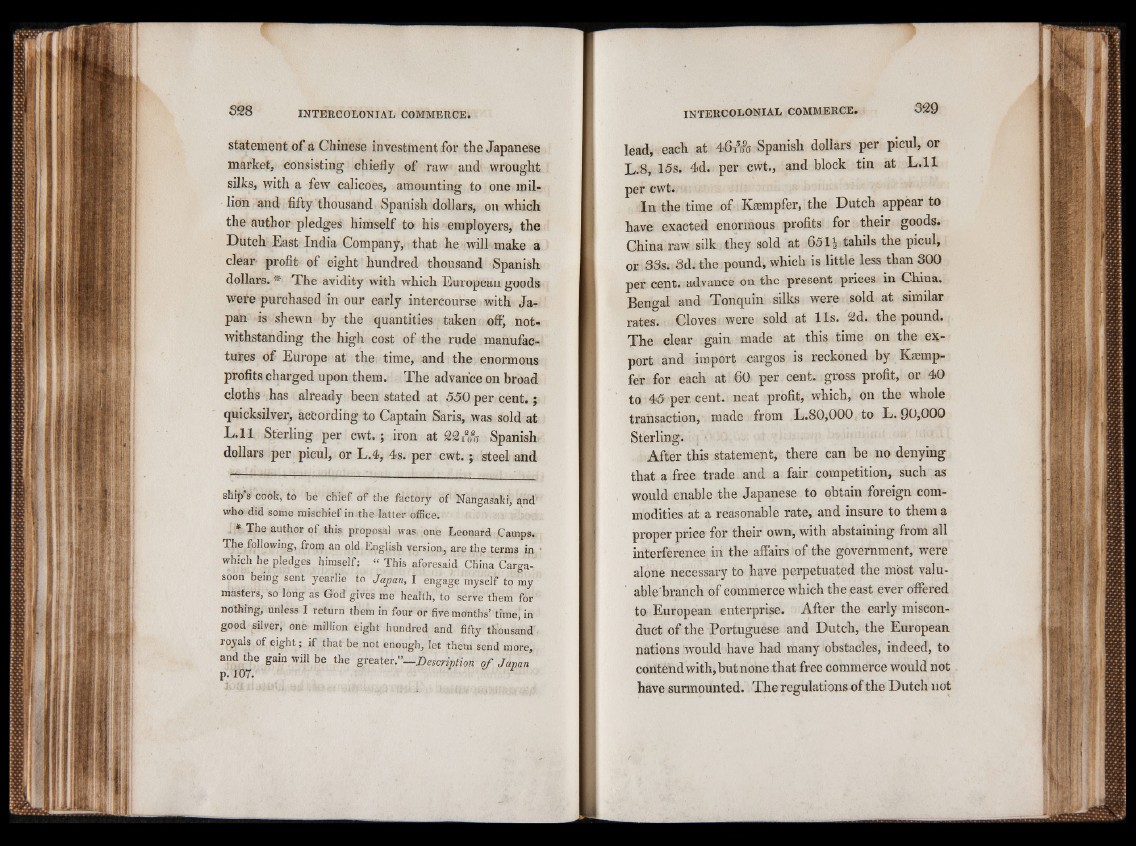
statement of a Chinese investment for the Japanese
market, consisting chiefly of raw and wrought
silks, with a few calicoes, amounting to one million
and fifty thousand Spanish dollars, on which
the author pledges himself to his employers, the
Dutch East India Company, that he will make a
clear profit of eight hundred thousand Spanish
dollars. * The avidity with which European goods
were purchased in our early intercourse with Japan
is shewn by the quantities taken off', notwithstanding
the high cost of the rude manufactures
of Europe at the, time, and the enormous
profits charged upon them. The advance on broad
qloths has already been stated at 550 per cent.;
quicksilver, according to Captain Saris, was sold at
L .ll Sterling per cwt.; iron at 2 2 ^ Spanish
dollars per picul, or LA, 4s. per cwt. j steel and
ship s cook, to be chief of the factory of Nangasaki, and
who did some mischief in the latter office.
1 * The author of this proposal was one Leonard Camps.
The following, from an old English version, are the terms in
which he pledges himself: “ This aforesaid China Cargasoon
being sent yearlie to Japan, I engage myself to my
masters, so long as God gives me health, to serve them for
nothing, unless I return them in four or five months’ time, in
good silver, one million eight hundred and fifty thousand
royals of eight; if that be not enough, let them send more,
and the gain will be the greater.”—Description o f Japan
n 1 A *1 •
lead, each at 46t3<& Spanish dollars per picul, or
L.8, 15s. 4d. per cwt., and block tin at L .ll
per cwt.
In the time of Kaempfer, the Dutch appear to
have exacted enormous profits for their goods.
China raw silk they sold at 65 l|;tahils the picul,
or 33s. 3d. the pound, which is little less than 300
per cent, advance on the present prices in China.
Bengal and Tonquin silks were sold at similar
rates. Cloves were sold at 11s. 2d. the pound.
The clear gain made at this time on the export
and import cargos is reckoned by Kasmp-
fer for each at 60 per cent, gross profit, or 40
to 45 per cent, neat profit, which, on the whole
transaction, made from L.80,000 to L. 90,000
Sterling.
After this statement, there can be no denying
that a free trade and a fair competition, such as
would enable the Japanese to obtain foreign commodities
at a reasonable rate, and insure to them a
proper price for their own, with abstaining from all
interference in the affairs of the government, were
alone necessary to have perpetuated the most valu-
able'branch of commerce which the east ever offered
to European enterprise. After the early misconduct
of the Portuguese and Dutch, the European
nations would have had many obstacles, indeed, to
contend with, but none that free commerce would not
have surmounted. The regulations of the Dutch not